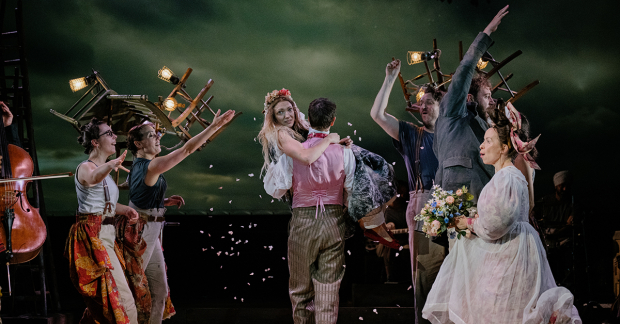Review: Emma Rice Brings All of Wuthering Heights to the Stage
Wise Children’s take on the Emily Brontë classic is making its US premiere at St. Ann’s Warehouse.

(© Teddy Wolff)
Give Emma Rice's stage adaptation of Wuthering Heights credit for thoroughness, at the very least. Whereas most stage and screen versions, including William Wyler's famous 1939 film version starring Laurence Olivier and Merle Oberon, only bring the first half of Emily Brontë's classic 1847 novel to the screen, Rice's more comprehensive take breezes through the multigenerational saga of the Earnshaws, the Lintons, and the foster child Heathcliff in just under three packed hours. Her feat of adaptation is now on display at St. Ann's Warehouse, where her theater company Wise Children's version is making its US premiere.
There is, of course, a reason why the first half of Brontë's novel tends to get the monopoly of attention in most adaptations. It's arguably the most purely romantic and dramatic section, charting the life of Heathcliff (Liam Tamne) and his adoption into the wealthy Earnshaw clan and his attraction to Catherine (Lucy McCormick, appropriately bursting with passion). His relatively impoverished orphan status, however, means that he not only bears much ill treatment from both Catherine's brother Hindley (Tama Phethean) and the rival Linton clan, but that Catherine, despite internally requiting Heathcliff's affections, ultimately ends up marrying Edgar Linton (Sam Archer) instead. After fleeing the eponymous Yorkshire farmhouse Wuthering Heights, Heathcliff returns three years later a rich man, kindling an affair with Edgar's sister, Isabella (Katy Owen), more out of revenge than passion. Edgar's response is to cut off all contact with him, a fact that eventually leads to Catherine's untimely death — but not before she gives birth to a child, whom she names Cathy.
Most adaptations end with that death and subsequent birth — a moment that leads Heathcliff to the heaven-storming moment in which he beckons Catherine's ghost to haunt him for the rest of his days. In Rice's version, though, that's only the end of Act 1. Act 2 focuses on the offspring of Heathcliff, Catherine, Edgar, and so on, as Young Cathy (Eleanor Sutton), Little Linton (also Owen), and Hareton Earnshaw (also Phethean) essentially deal with the sins of their forebears and try to forge their own paths, away from the dark shadows cast by the older generation.
As one might gather from the two paragraphs above, those are a lot of characters and plot threads to keep straight in Wuthering Heights. Rice not only recognizes that particular challenge of adapting Brontë's book, but incorporates it into her adaptation through occasional fourth-wall-breaking gestures. Not only do some performers make jokey asides about how difficult it is to juggle them all in one's head, but some performers also hold up small chalkboards with a character's name written on it after they die.
That's just one of many imaginative touches Rice comes up with to make her Wuthering Heights work as a piece of theater. Another is her reconceptualization of the moors not just as the windswept setting for all this familial and generational intrigue — embodied in Vicki Mortimer's spare set design and Simon Baker's atmospheric sound and video designs — but as a Greek chorus of nine performers led by the magnetic Nandi Bhebhe (donning a particularly eye-catching headdress designed by Giuseppe Cannas). Oh, and did I mention Rice's Wuthering Heights is a musical? Ian Ross's songs punctuate the proceedings — rarely memorable in and of themselves, but adding to the show's playful texture.
Rice's irreverence certainly makes for a breezily entertaining evening. Whether it adds anything to our appreciation of Brontë's original text is more debatable. Her most intriguing touch in that regard (albeit one perhaps inspired by Andrea Arnold's 2011 film adaptation) lies in the casting of Heathcliff. Liam Tamne is of African, Indian, and Irish heritage, while most of the principal cast are white, thus furthering the sense of an outsider trying to penetrate a well-protected inner circle. Tamne also plays the role in a way that strips his character of any shred of romantic warmth — perhaps a more honest approach, given that Heathcliff is, in many ways, a deeply unsavory character, a man driven almost entirely by resentment once he's given the keys to this particular Yorkshire kingdom.
Otherwise, though, considering how faithful Rice is to the book (in letter if not in spirit), how one responds to this Wuthering Heights depends on what one thinks of Brontë's novel in the first place. Those who don't know the book going in will certainly find in this production a reasonably engaging entry point into its themes of forbidden love and class struggle, but may ultimately find it all rather dated and emotionally remote. But at least the show's playful surface scintillates.









